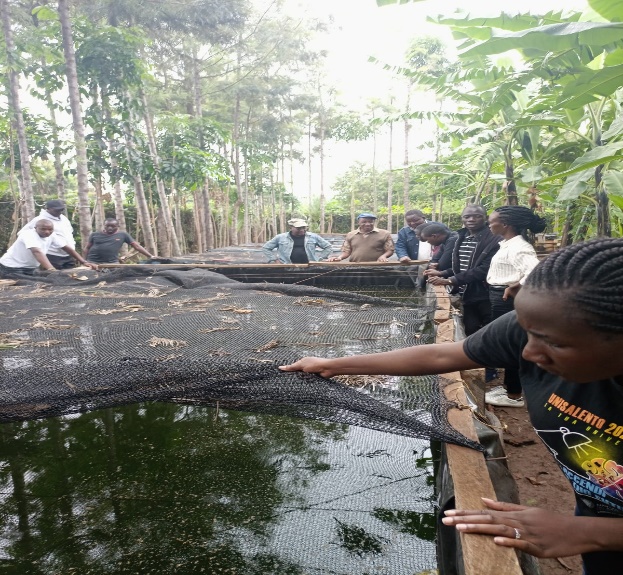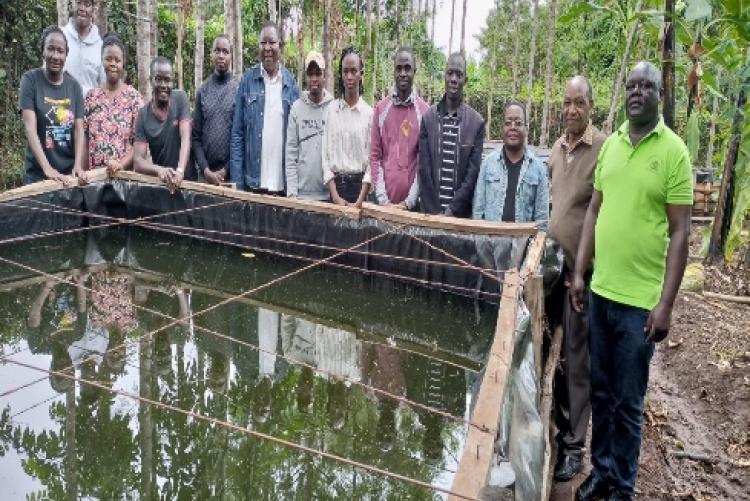ACADEMIC TRIP FOR MSC. FISH SCIENCE STUDENTS TO TAITA-TAVETA AND MOMBASA COUNTIES, KENYA
A). Summary: Seven MSc. Fish Science students were taken for an academic trip to Taita-Taveta and Mombasa counties from 3rd to 7th May 2022. Members of staff involved in this trip were:-
- Prof. P.G. Mbuthia
- Dr. R.M. Waruiru – Trip coordinator
- Dr. I.R. Mulei
- Mr. G.A. Dimbu
- Mr. Gilbert Ireri - Driver
B)Trip objective: MSc. Fish Science students lack essential knowledge on how to breed, feed, raise fish under different production systems, collect diagnostic/research samples and manage fish diseases. The field trip was organized for the students to receive firsthand information and be able to:-
- Explain how biosafety and biosecurity in aquaculture can be used to manage fish
diseases in integrated fish farming
- Take and analyze physico-chemical parameters in a pond ecosystem
- Describe laboratory diagnosis of fish diseases under field conditions
- Establish research links, gaps and site(s) for MSc. thesis project(s)
- Undertake fish inspection at points of entry and understand transboundary
regulations of diseases which may interfere with export/import of fish in the country.
C): Trip outcomes
i: The Kabete team and six (6) MSc. students visited two fresh water lakes namely L. Chala and L.
Jibe. Main fish species found in these lakes include Oreochromis hunteri (L. Chala), O. jibe (L.
jipe) and O. niloticus (both lakes) among others. Fish harvested in L. jipe were mainly juveniles
(95% Nile tilapia; 5% Jipe tilapia) as fishermen used the illegal gillnets (1.5-2 mm) for fishing.
We bought fish from the two lakes for demonstrations and parasite collection in the laboratory.
ii. The team visited several fish farmers within Taveta Sub-county. Main species raised were Nile tilapia,
catfish and Jipe tilapia. There was massive mortality of O. niloticus fingerlings in one farm due to
temperature shock after heavy rains and samples were taken for analysis at Regional Veterinary
Investigation Laboratory (RVIL), Mariakani.
iii. The team visited various diagnostic facilities at RVIL, Mariakani and proposed to the management
that two students could analyze fish research samples in the Microbiology and Parasitology sections
of the laboratory.
iv. In Mombasa the team visited the Port Veterinary office situated at the Kenya Port Authority (KPA). Dr. Ndegwa (MSc. student) and his team took us through surveillance procedures of diseases while importing/exporting animals and their products.
iv. The team later went to the Mombasa Marine Park and had a good time watching marine fishes like parrotfish, lionfish and zebrafish among others.
D): Conclusions
The following were the highlights:-
- That two students, Dr. Ndegwa (bacteriology) and Ms. Matuma (parasitology) will undertake their MSc. projects in Taveta Sub-county where they will sample fish from Lake Jibe and surrounding fish farms
- That samples collected will be processed and analyzed at the RVIL, Mariakani as their facilities are excellent
- That fisheries officers from Taita-Taveta County should be considered for the proposed Worldfish training in Abbassa, Egypt in July/August 2022.

- Log in to post comments

